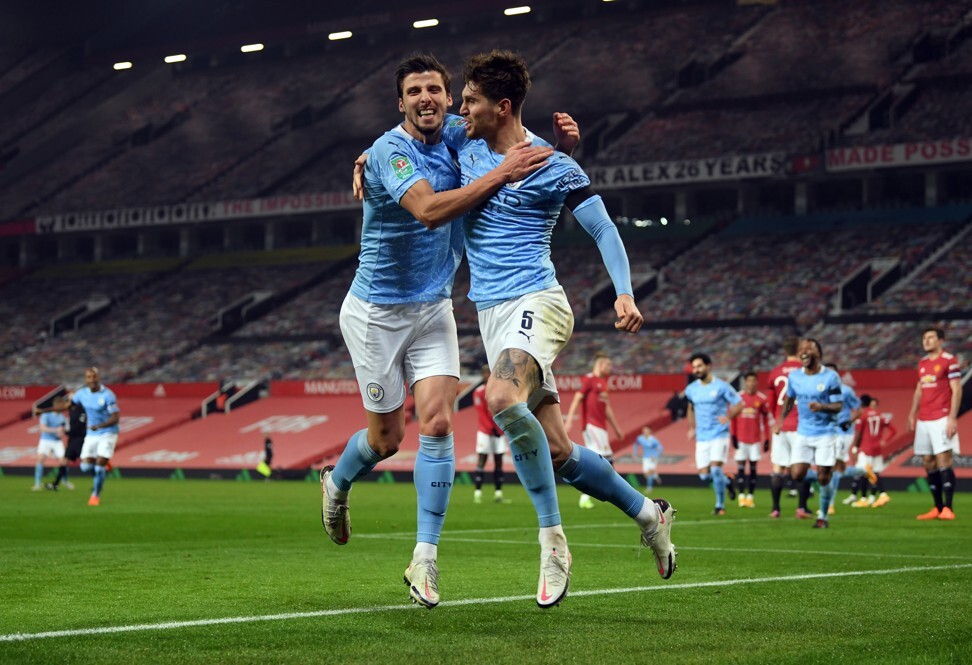
Manchester United are much improved, but the small margins are what make also-rans into champions
- Ole Gunnar Solskjaer’s side found out on Wednesday that it’s the almost imperceptible advantages that make champions
Ole Gunnar Solskjaer talks about the small margins that win the biggest games. On Wednesday against Manchester City, those margins were superior performances from players in blue. Fred didn’t play as well as his former teammate Fernandinho in a similar role, while the same could be said of Victor Lindelof and his old clubmate Ruben Dias, who was the man of match. They just had that little bit more than their United equivalents.
Dias was Lindelof’s replacement when the Swede departed for Manchester United in 2017. Lindelof is three years older. Benfica give emerging talents a respected stage in a Champions League class side and then move them on. The Manchester clubs have five players who came through Benfica’s system, and United also signed Bruno Fernandes and Alex Telles from Portugal.
As Benfica’s chief executive Domingos Oliveira told the Post: “Our core business is to find the best at an early stage. Finding players while they’re cheaper allows us to sell them on as they’re moving towards the top. If you play for one of the big three clubs in Portugal then you have a ‘guarantee’ stamp.”
Dias played twice against United in 2017 for a Benfica side who lost all six of their Champions League group games, but he was allowed to learn, make mistakes and improve. By 2020 he was ready to be sold for a huge €68 million fee and he’s been steady and without drama for City. United also watched Dias when he was at Benfica but didn’t go for him.
United currently have six first team players in that position, though only four play since Phil Jones has been afflicted by injury and Marcos Rojo isn’t selected. United would prefer to move a defender or two on before buying another, yet continue to scout central defenders for a reason. Is that the priority in a team which needs top level talent in a couple of areas? That’s one for the manager Solskjaer after he saw his side concede both goals from set pieces against City in Wednesday’s Carabao Cup semi-final defeat.
United’s last three defeats came against Paris Saint-Germain, RB Leipzig and Manchester City. The deficiencies were shown right there when it mattered
It was the fourth consecutive semi-final defeat under the Norwegian. That’s four more than Alex Ferguson reached in his first two years at United, but Ferguson became a habitual winner in semi-finals and, crucially, finals.
Harry Maguire and Victor Lindelof have been Solskjaer’s preferred central defensive partnership, though the fleet-heeled Eric Bailly has performed well lately and could consider himself unlucky not to start in the defeat against City. Bailly’s issue has been injuries and errors: both absent as he played every minute of United’s last three league games.
City’s three main central defenders are John Stones, Aymeric Laporte and Ruben Dias. United’s are Maguire, Lindelof and Bailly, Liverpool’s Virgil van Dijk, Joel Matip and Joe Gomez. Matip is excellent but injury-prone. Perhaps Fabinho would be the best player alongside Van Dijk when Liverpool have no injuries, but he’d be a significant loss in midfield.
Small margins and smarter recruitment gave Liverpool and City the edge there, but Liverpool’s defence was heavily criticised before Van Dijk joined and it’s their main concern this season, while City spent a fortune to improve theirs.
Amid superb form and impressive performances that have quietened their critics, United’s last three defeats came against Paris Saint-Germain, RB Leipzig and City. The deficiencies were shown right there when it mattered, though United also beat all of those sides in earlier games when it mattered a little less.

Solskjaer is doing a good job and closing the gap. He also has United in a first title race since the league last came to Old Trafford in 2013. Jose Mourinho’s United picked up 81 points in 2017-18, but weren’t in a race. Mourinho won trophies too and that mattered, but the football and his own mood soured in 2018 and he admitted he should have been dismissed.
Solskjaer needs his first trophy. It won’t be in the Carabao Cup this season, but he has the FA Cup and Uefa Europa League to play for, the first FA Cup game against Watford on Saturday. No simple matter – he needs once again to reach the semi-finals in both, then get beyond them while all the time competing at the top of the Premier League.
Solskjaer will welcome the Ivorian winger Amad Diallo, 18, from Atalanta, but may not add further to his first team in this January transfer window, though the appointment of Darren Fletcher to his coaching staff looks shrewd. He will help to work on cutting back the small margins that have begun to matter so much. It’s tough at the top.

